Conference Highlights: Racial Equity, Collaboration, and Resilience as Themes
Water work has continued despite the pandemic.
The pandemic has highlighted just how essential access to clean water really is. Despite the challenges of 2020, Jersey Water Works members continued to lead the way in advancing New Jersey water infrastructure goals.
These advances were highlighted during the Jersey Water Works sixth annual conference, held virtually December 9-11. The conference included 355 attendees and 10 unique sessions facilitated by national and local experts.
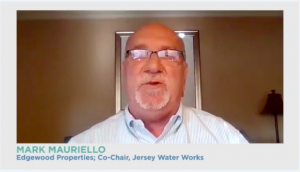
Jersey Water Works Co-Chair Mark Mauriello kicked off the conference by recognizing the hard work of members. “From writing recommendations and testifying at public hearings, adopting a catch basin, and talking to your peers; the members of Jersey Water Works, over 600 of you, have worked so hard to improve our water infrastructure.” Mauriello also highlighted progress made in achieving water infrastructure goals. “For the first time in decades, the state budget now includes a line item for dedicated funding for water infrastructure. Long Term Control Plans (LTCPs) to reduce sewage overflows have been submitted to the New Jersey Department of Environmental Protection (NJDEP). These plans are still under review, but Jersey Water Works is ensuring that they will be greener and more responsive to community needs. Starting in March, all development projects must start with green infrastructure in their designs to manage stormwater, and the governor, legislature and the DEP are working together to take real, meaningful actions to once and for all address the problem of lead in our drinking water.”
Additionally, during the past fiscal year, the state Water Bank closed on 85 short-term loans for 60 clean water projects totaling just under $310 million, and 25 drinking water projects totaling over $117 million. Kati Angarone added that the NJDEP is working with the New Jersey Economic Development Authority and has expanded the Community Collaborative Initiative partnership, actively working with stakeholders in Newark, Paterson, Camden, Jersey City, Perth Amboy, and Trenton.
Progress on water equity and environment justice

New Jersey Department of Environmental Protection Associate Commissioner for Science and Policy Kati Angarone shared Governor Murphy’s administration’s environmental justice agenda for water. “At DEP, we know that protecting communities from pollution, restoring compromised waterways and watersheds, making communities more resilient to climate change, and providing safe drinking water all further the goal of environmental justice,” Kati explained. NJDEP is helping communities navigate its department, and is hosting environmental justice listening sessions to better understand the needs of overburdened communities. NJDEP values the leadership and expertise of JWW and is asking JWW members to be active participants in public dialogue for the new environmental justice law. The dialogue will be an important part of how NJDEP shapes the new regulations.
New Jersey also has been working to implement more stringent lead in drinking water requirements than the federal rule, and NJDEP is in the process of developing its own Lead and Copper Rule. In an address to conference attendees, Governor Murphy stated that his administration “is determined to eliminate the risk of lead poisoning… through the replacement of lead service lines, water infrastructure upgrades, as well as assisting local governments in managing stormwater runoff.”
NJDEP is currently reviewing the required 24 Long Term Control Plans that will determine the solutions to reduce localized flooding and the raw sewage dumped into our waterways over the next 30 years, and encourages and welcomes public input on the plans. Public comments are due to NJDEP on January 31.
Transformation into resilience: We’re in it for the long run
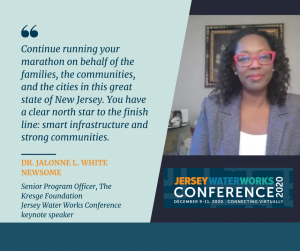
Transforming New Jersey’s water infrastructure is a long process, which requires continued dedication through uncertainty. Dr. Jalonne White-Newsome, Senior Program Officer of the Kresge Foundation, compared this journey to a marathon, urging conference participants and the Jersey Water Works collaborative to “continue running your marathon on behalf of the families, communities, and cities in this great state of New Jersey.”
She insisted we keep three essential pieces in mind: the spirit of collaboration, using a racial equity lens, and resilience, as this work is long term. Dr. White-Newsome cautioned, “[Water] regulations by themselves have not been quite able to solve the whole problem. In fact, they have not been able to really, fully counter the social, political environment girded in institutional and structural racism that time and time again fail to protect all communities in the same way.”
Substantial funding provides opportunities for innovative investment
Local leaders and government officials play an essential role in gaining public support for water infrastructure projects while advocating for more funding. Newark Mayor Ras Baraka shared the City of Newark’s water infrastructure advancements, notably the initiative to replace lead service lines, serving as a national model. Baraka said, “Federal and state governments need to look upon water infrastructure the same way they view roads and bridges and aviation facilities, as being absolutely vital to the health and well being of our residents and their communities.”
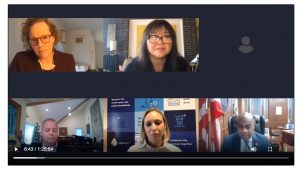
The state budget included a $60 million line item dedicated to water infrastructure. Although the funding is a great start, it does not cover the state’s water infrastructure improvement needs. Due to the pandemic, some utilities are struggling to access funding for projects beyond basic maintenance, a trend that is not just showing in New Jersey. Mami Hara, Seattle Public Utilities, reminded the audience that “revenue losses in the water sector from Covid will approximate $14 billion (17%) by 2021, exacerbating the usual challenges that water facilities face in securing proper investment.”
David Zimmer New Jersey Infrastructure Bank, noted that public support for spending will help funding advocates meet the needs of the water sector, “We need to do a better job of explaining to the public the true cost of necessary investments in our water and wastewater systems and the resulting benefits, including direct benefits such as energy savings and improved system reliability and indirect benefits such as reduced flooding, less traffic congestion from water main breaks, and better health care (e.g., lead service lines).”
Megan Glover, CEO of 120 Water, said, “Innovation in the water and wastewater sectors must be part of the conversation because there simply is not enough state and federal funding available to address all of the critical needs that exist.” Andy Kricun, Moonshot Missions, understands how innovative funding can drastically enhance a system’s potential, from his former role in Camden County Municipal Utilities Authority. Using the New Jersey Infrastructure Bank to help fund projects, balancing green and gray infrastructure, and implementing a stormwater fee, can help utilities be cost-effective while maximizing community benefit.
Aspiring to a better tomorrow. But, where are we now?
The ability to measure data will help everyone see where we are and where we need to go. Dan Van Abs, Rutgers University, and a member of the Jersey WaterCheck data advisory committee, presented the Jersey WaterCheck database, a new data dashboard that provides information about every utility. “If we want to aspire to a better situation, we need to know what our current situation is,” said Dan Van Abs, Rutgers University, and a member of the Jersey WaterCheck data advisory committee. “The understanding of data is a critical function that all of us can play.”
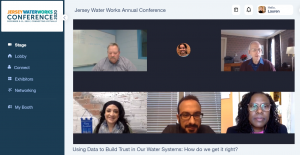
Shadi Eskaf, Environmental Finance Center at The University of North Carolina at Chapel Hill, studies national trends, such as the disproportionate impact of raising customer rates. “The costs keep going up.” Shadi explains, “Utilities need to find a way to be sustainable.” Stephen Blankenship, Hamilton Township Municipal Utilities Authority, understands the importance of data as a utility executive. “It’s one thing to collect data; it’s another to understand it.” Stephen said that there is a lot the public doesn’t realize about water utilities. “Tap water does deliver. Our price is low. A lot of people don’t know that. We have to tell our story more.” Stephanie Corso, CEO and co-founder of Rogue Water LLC, also noted the “gap between perception and reality.” Stephanie noted that public support for water and infrastructure projects could go a long way. “Data can bridge the gap in perception,” she said.
Public outreach and engagement, coupled with using data to tell stories, can gain support and build trust for essential water and wastewater infrastructure projects, and lead to innovative solutions that better fit the needs of the community. Jennifer Gonzalez, director of environmental services and chief sustainability officer of The City of Hoboken, explained the necessity of public support. Hoboken has a combined sewer system, and “a big part of our goal with stormwater management is to educate the public,” she said. Charlotte Katzenmoyer, Capital Region Water, described public outreach and engagement campaigns they employed to educate the public. Wynnie-Fred Victor Hinds pointed out the lack of trust from the public in terms of water quality. Wynnie urged us to continue to collaborate and hold legislators accountable for prioritizing water as a public health issue.
Education and advocacy continue to be an area of opportunity.
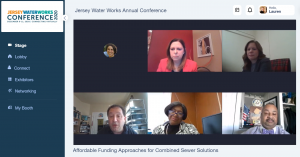
Paterson Councilwoman Ruby Cotton emphasized that practitioners must have the support of elected officials to advance important water infrastructure improvements to protect public health and waterways. Members of the Jersey Water Works collaborative drafted a letter advocating for representatives to prioritize water in a new federal spending plan, and US Representative Donald Payne, Jr. will raise these priorities with the New Jersey delegation.
Rep. Payne strongly encourages “contacting your members of congress and putting [water infrastructure needs] on their map. There are so many issues that we deal with that this could potentially be something that is missed, so reminding [congress members] that [this] is something important to your community goes a long way.” He added, it’s a matter of the “community continuing to interact with your members of congress and making sure that this is high on the priority list.”
Commitments from our members mark our responsibility to work together to transform water infrastructure
Jersey Water Works members shared the commitments for 2021 from more than 35 member organizations to advance water projects.
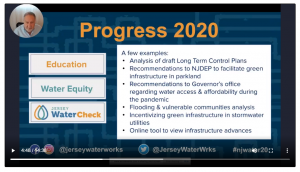
This year, 25 organizations committed to projects in partnership with other JWW member organizations ranging from utility investment, green infrastructure and stormwater management, reports and guidance, education and outreach, and more.
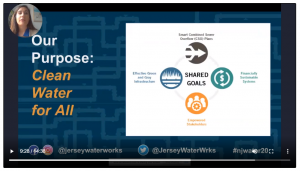
As Jane Kenny, co-chair of the JWW collaborative, reiterated in her welcome address, “We have an aging water infrastructure. The systems, built years ago to bring water to our homes, require maintenance, upkeep, and in some cases, total replacement. Jersey Water Works is an umbrella organization where its members support the common goal of improving water infrastructure. Our conference helps us to continue to share information so our members can continue to take on the responsibility of working together.”
